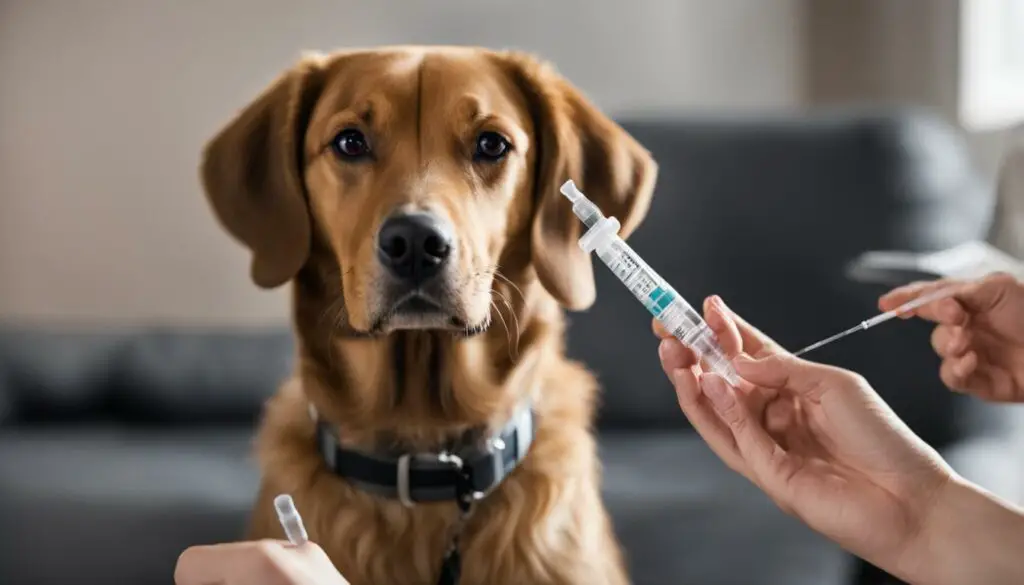Welcome to my comprehensive guide on Agmectin for dogs. As a responsible dog owner, it’s crucial to understand the importance of proper parasite control for the health and well-being of your furry friend. In this guide, I will provide you with all the essential information you need to know about Agmectin, including its uses, dosage, potential side effects, and safety measures. Whether you’re looking for the best flea and tick treatment or seeking advice on agmectin dosage for dogs, you’ve come to the right place.
Agmectin, also known as Ivermectin, is a commonly used medication for the prevention and treatment of various parasites in dogs. It is a safe and effective treatment option when used as directed by a veterinarian. However, it’s crucial to note that Agmectin should not be used in dogs with the MDR1 gene mutation, as it can cause neurotoxicity.
Agmectin is primarily used for heartworm prevention and the treatment of internal and external parasites. It comes in various formulations, including tablets, chewable tablets, topical liquids, and injectable liquids. The specific formulation and dosage will depend on your dog’s body weight and the type of parasite being treated.
While Agmectin is generally safe, there can be potential side effects, especially in dogs with certain genetic mutations. It’s essential to monitor your dog for any unusual symptoms and consult with a veterinarian if you have any concerns.
Remember, the dosage and administration of Agmectin should always be done under the guidance of a veterinarian. It’s crucial to follow their advice to ensure the effectiveness and safety of the medication for your beloved canine companion.
Key Takeaways
- Agmectin, or Ivermectin, is a widely used medication for parasite prevention and treatment in dogs.
- It should not be used in dogs with the MDR1 gene mutation, as it can cause neurotoxicity.
- Agmectin is primarily used for heartworm prevention and the treatment of internal and external parasites.
- Potential side effects of Agmectin in dogs include vomiting, tremors, seizures, and loss of appetite.
- Always consult with a veterinarian for proper dosage, administration, and safety precautions when using Agmectin for your dog.
The Importance of Agmectin for Heartworm Prevention in Dogs
Agmectin, also known as Ivermectin, is an essential medication for preventing heartworm infestations in dogs. Heartworm disease is a serious and potentially life-threatening condition caused by parasitic worms that reside in a dog’s heart and blood vessels. Agmectin is highly effective in killing the immature heartworm larvae and preventing them from developing into adult worms.
Using Agmectin for heartworm prevention is crucial, as heartworm disease can lead to severe health complications and even death in dogs if left untreated. Therefore, it is recommended by veterinarians as one of the best flea and tick treatments for dogs, as it also provides protection against other parasites. Agmectin has received positive reviews from dog owners who have witnessed its effectiveness in keeping their pets healthy and free from heartworm infection.
However, it is important to prioritize the safety of your furry friend when using Agmectin. Like any medication, Agmectin can have potential side effects and should be used under the guidance of a veterinarian. It is crucial to follow proper dosage and safety guidelines to ensure the well-being of your dog. Consulting with a veterinarian will help determine the appropriate dosage for your dog’s weight and provide necessary precautions to minimize any potential risks associated with Agmectin usage.
| Benefits of Agmectin for Heartworm Prevention | Precautions for Using Agmectin |
|---|---|
|
|

“Using Agmectin for heartworm prevention is crucial, as heartworm disease can lead to severe health complications and even death in dogs if left untreated.”
Conclusion
Agmectin plays a vital role in the prevention of heartworm disease in dogs. It is highly effective and recommended by veterinarians as a safe and reliable option for heartworm prevention. However, it is essential to use Agmectin responsibly and under the guidance of a veterinarian to ensure the safety and well-being of your furry companion. By following proper dosage instructions and monitoring for any potential side effects, you can help keep your dog protected from harmful parasites and ensure their overall health and happiness.
Agmectin for the Treatment of Internal Parasites in Dogs
Agmectin, also known as Ivermectin, is an effective medication for treating internal parasites in dogs. It is commonly used to eliminate roundworms, hookworms, and capillaria, providing relief and improving the overall health of dogs. When administered as directed by a veterinarian, Agmectin can effectively target and eliminate these parasites, ensuring the well-being of our furry friends.
The usage of Agmectin for internal parasite treatment in dogs is dependent on various factors, including the dog’s body weight and the specific parasite being treated. The dosage should be determined by a veterinarian to ensure the correct amount is administered. It is important to note that Agmectin is not effective against tapeworms and should not be used for this purpose.
To further understand the effectiveness of Agmectin for internal parasite treatment in dogs, refer to the table below:
| Parasite | Agmectin Dosage | Treatment Duration |
|---|---|---|
| Roundworms | 0.1 milligram per pound (0.2 milligram/kilogram) | As prescribed by the veterinarian |
| Hookworms | 0.1 milligram per pound (0.2 milligram/kilogram) | As prescribed by the veterinarian |
| Capillaria | 0.1 milligram per pound (0.2 milligram/kilogram) | As prescribed by the veterinarian |
It is important to follow the dosage instructions provided by the veterinarian and complete the full treatment course to ensure the effective elimination of internal parasites. Regular check-ups and fecal testing may be recommended to monitor the progress and effectiveness of the treatment.
Agmectin for the Treatment of External Parasites in Dogs
When it comes to treating external parasites in dogs, Agmectin, also known as Ivermectin, can be a valuable option. While it is not effective against ticks, fleas, flukes, and flies, it can be used to treat certain external parasites such as demodectic mange, sarcoptic mange, ear mites, and some other mites and lice. However, it is important to follow proper dosage instructions and consult with a veterinarian before using Agmectin for the treatment of external parasites in dogs.
To ensure the effectiveness of Agmectin, it is crucial to administer the medication in the correct dosage. The recommended dosage varies depending on the dog’s body weight and the specific parasite being treated. It is essential to follow the dosage guidelines provided by a veterinarian to avoid under or overdosing. Additionally, if a dose of Agmectin is missed, it should be given as soon as remembered, but it is important to consult with a veterinarian if it has been more than two weeks, as the dog’s parasite control may be compromised.
While Agmectin can be an effective treatment for external parasites in dogs, it is important to be aware of any potential side effects. These can include vomiting, dilated pupils, blindness, tremors, seizures, lack of coordination, appetite loss, lethargy, and dehydration. It is crucial to monitor your dog for any unusual symptoms and consult with a veterinarian if you have any concerns.
Table: Agmectin Dosage for External Parasites in Dogs
| Parasite | Recommended Dosage |
|---|---|
| Demodectic mange | 0.2 milligram per pound (0.4 milligram/kilogram) every week for 6-8 weeks |
| Sarcoptic mange | 0.3 milligram per pound (0.6 milligram/kilogram) twice, 2 weeks apart |
| Ear mites | 0.1 milligram per pound (0.2 milligram/kilogram) once |
| Other mites and lice | 0.1 milligram per pound (0.2 milligram/kilogram) once |

Overall, Agmectin can be an effective option for the treatment of certain external parasites in dogs. However, it is crucial to consult with a veterinarian and follow their guidance to ensure the proper administration and safety of the medication. By following the recommended dosage and monitoring your dog for any potential side effects, you can help keep your furry friend free from external parasites and ensure their overall well-being.
Potential Side Effects of Agmectin in Dogs
While Agmectin is generally safe when used as directed, it is important to be aware of potential side effects that can occur in dogs. These side effects may vary in severity and can include:
- Vomiting
- Dilated pupils
- Blindness
- Tremors
- Seizures
- Lack of coordination
- Appetite loss
- Lethargy
- Dehydration
It is important to note that not all dogs will experience these side effects, and they may differ depending on the individual dog’s sensitivity and the dosage administered. However, it is crucial to monitor your dog closely for any unusual symptoms or behaviors when using Agmectin.
Dogs with certain genetic mutations, such as the MDR1 gene mutation, are more susceptible to the toxic effects of Agmectin and should not be given the medication. If you are unsure whether your dog has this genetic mutation, it is best to consult with a veterinarian before using Agmectin.
If you notice any of these side effects or have concerns about your dog’s reaction to Agmectin, it is important to seek veterinary attention immediately. Your veterinarian will be able to assess the situation and provide appropriate guidance and treatment if necessary.

Conclusion:
Agmectin is an effective medication for the prevention and treatment of various parasites in dogs. While it is generally safe when used as directed, it is important for dog owners to be aware of the potential side effects that may occur. By understanding and monitoring for these side effects, pet owners can ensure the well-being and safety of their dogs when using Agmectin. It is always recommended to consult with a veterinarian before starting any medication to ensure it is suitable for your dog’s specific needs and health condition.
Proper Dosage of Agmectin for Dogs
When it comes to administering Agmectin to your dog, it is essential to follow the recommended dosage guidelines provided by your veterinarian. The dosage of Agmectin varies depending on your dog’s body weight and the specific parasite being treated. This ensures the effectiveness and safety of the medication for your furry companion.
For heartworm prevention, the typical dosage is 0.0015-0.003 milligram per pound (0.003 to 0.006 milligram/kilogram) once a month. This helps protect your dog from heartworm infestations, which can be life-threatening.
For the treatment of skin parasites, such as mange and mites, the dosage is typically 0.15 milligram per pound (0.3 milligram per kilogram). In some cases, this dosage may need to be repeated after 14 days to ensure complete eradication of the parasites.
For the treatment of internal worms, such as roundworms and hookworms, the dosage is typically 0.1 milligram per pound (0.2 milligram/kilogram). This helps eliminate these parasites and ensures the overall health of your dog.
Proper Dosage of Agmectin for Dogs
| Parasite | Dosage |
|---|---|
| Heartworm prevention | 0.0015-0.003 milligram per pound (0.003 to 0.006 milligram/kilogram) once a month |
| Skin parasites (mange, mites) | 0.15 milligram per pound (0.3 milligram per kilogram) |
| Internal worms (roundworms, hookworms) | 0.1 milligram per pound (0.2 milligram/kilogram) |
It is crucial to remember that the dosage may vary depending on the specific circumstances and the advice of your veterinarian. Always consult with a professional before administering any medication to your dog to ensure their health and well-being.

Administration of Agmectin and Missed Doses
Administering Agmectin to your dog and ensuring that they receive the proper dosage is essential for their health and safety. Agmectin comes in various formulations, including tablets, chewable tablets, topical liquids, and injectable liquids. The specific formulation will depend on your veterinarian’s recommendation and your dog’s individual needs.
When administering Agmectin, it is generally recommended to give the medication with or without food, although giving it with food may help prevent stomach upset in some dogs. It is important to follow your veterinarian’s instructions on how to properly administer the medication to ensure its effectiveness.
If you happen to miss a dose of Agmectin, it is important not to panic. Simply give the missed dose as soon as you remember, and then continue with the regular dosing schedule. However, if it has been more than two weeks since the missed dose, it is crucial to consult with your veterinarian. Missing a dose may compromise your dog’s heartworm prevention, and your veterinarian will be able to advise you on the appropriate course of action.
Table: Agmectin Administration Guidelines
| Formulation | Administration |
|---|---|
| Tablets | Orally, with or without food |
| Chewable Tablets | Orally, with or without food |
| Topical Liquids | Applied directly to the skin, avoiding the eyes and mouth |
| Injectable Liquids | Administered by a veterinarian |
It is crucial to never double dose your dog to make up for a missed dose. Doubling the dosage can lead to an overdose and serious side effects. Always follow the recommended dosing instructions provided by your veterinarian.
Remember, the administration of Agmectin and the management of missed doses should always be done in consultation with a veterinarian. They can provide you with personalized advice and guidance based on your dog’s specific needs and health condition.
Precautions and Safety Measures for Agmectin in Dogs
When it comes to using Agmectin for the health and well-being of your dog, it’s important to take certain precautions and follow safety measures to ensure their safety. Here are some key considerations to keep in mind:
MDR1 Gene Mutation
Dogs with the MDR1 gene mutation are at increased risk of experiencing neurotoxicity when given Agmectin. This gene mutation is commonly found in certain breeds like Collies, Australian Shepherds, and German Shepherds. Therefore, it’s crucial to have your dog tested for this genetic mutation before administering Agmectin. If your dog tests positive for the MDR1 gene mutation, alternative treatment options should be explored to avoid any potential harm.
Avoid Use in Puppies and Pregnant/Lactating Dogs
Agmectin should not be used in puppies younger than six weeks of age. Additionally, pregnant and lactating female dogs should not be given Agmectin, as its safety for these stages of canine life has not been established. Consulting with a veterinarian is essential to determine alternative treatment options that are safe for puppies and pregnant or lactating dogs.
Proper Dosage Guidelines
To ensure the safety and effectiveness of Agmectin, it’s crucial to follow proper dosage guidelines provided by your veterinarian. The recommended dosage will depend on your dog’s body weight and the specific parasite being treated. Avoid self-medicating or guessing the dosage, as incorrect administration can lead to adverse effects or treatment failure. Your veterinarian will determine the appropriate dosage based on your dog’s individual needs and health condition.
| Weight Range (lbs) | Agmectin Dosage (mg) |
|---|---|
| 10 – 20 | 0.1 |
| 20 – 40 | 0.2 |
| 40 – 60 | 0.3 |
| 60 – 80 | 0.4 |
| 80 – 100 | 0.5 |

Table: Agmectin Dosage Guidelines for Dogs based on Weight Range
By adhering to these safety measures and precautions, you can help ensure the well-being and safety of your furry friend when using Agmectin. Consulting with a veterinarian will provide the guidance and support needed to make informed decisions about the health and parasite control of your beloved dog.
Interactions and Storage of Agmectin for Dogs
When administering Agmectin to your dog, it is important to be aware of any potential interactions with other medications. Agmectin may interact with antifungals, antibiotics, immunosuppressants, and high blood pressure medications. To ensure the safety and effectiveness of Agmectin, it is essential to inform your veterinarian about any medications or supplements your dog is currently taking. This will allow them to make any necessary adjustments or suggest alternative treatments if needed. By taking these precautions, you can avoid any potential complications or adverse reactions.
Proper storage of Agmectin is also crucial in maintaining its effectiveness. It should be stored at room temperature in a cool, dry place, away from direct sunlight and heat. Exposure to heat and moisture can reduce the potency of the medication. It is recommended to keep Agmectin in its original packaging or container, ensuring it is tightly sealed to prevent any contamination. By following these storage guidelines, you can ensure that Agmectin remains potent and ready for use when needed.
| Medication | Interactions with Agmectin |
|---|---|
| Antifungals | Possible interactions, consult your veterinarian |
| Antibiotics | Possible interactions, consult your veterinarian |
| Immunosuppressants | Possible interactions, consult your veterinarian |
| High blood pressure medications | Possible interactions, consult your veterinarian |
“It is essential to inform your veterinarian about any medications or supplements your dog is currently taking to ensure the safety and effectiveness of Agmectin.”
It is important to note that Agmectin should not be used in dogs with the MDR1 gene mutation, as it can cause neurotoxicity. Additionally, certain dog breeds, such as Collies, Australian Shepherds, and German Shepherds, may also be more susceptible to the toxic effects of Agmectin. It is crucial to consult with a veterinarian to determine if Agmectin is safe for your dog and to follow all safety measures when administering the medication. By taking these precautions, you can ensure the well-being and health of your furry friend.
Alternatives to Agmectin for Dogs with Sensitivities
While Agmectin is a widely used and effective medication for the prevention and treatment of parasites in dogs, some dogs may have sensitivities or adverse reactions to the medication. In such cases, it is important to explore alternative options to ensure the well-being of your furry friend. Here are some alternatives to Agmectin that can be considered:
| Alternative | Description | Pros | Cons |
|---|---|---|---|
| Amitraz | Amitraz is a topical treatment that is effective against ticks, fleas, and mites. | – Kills a wide range of external parasites – Easy to apply |
– Potential side effects – Requires regular application |
| Selamectin | Selamectin is a topical solution that treats and prevents fleas, ticks, ear mites, and certain internal parasites. | – Effective against a variety of parasites – Once-a-month application |
– May cause mild skin reactions – Prescription required |
| Milbemycin | Milbemycin is an oral medication that treats and prevents heartworms, roundworms, hookworms, and whipworms. | – Effective against multiple internal parasites – Easy to administer |
– May cause gastrointestinal upset – Prescription required |
| Moxidectin | Moxidectin is a topical solution that provides broad-spectrum protection against fleas, ticks, heartworms, and certain internal parasites. | – Protects against a range of parasites – Once-a-month application |
– Potential skin reactions – Prescription required |
It is important to consult with a veterinarian to determine the most suitable alternative for your dog’s specific needs and sensitivities. The veterinarian will consider factors such as your dog’s health condition, lifestyle, and potential allergies or sensitivities before recommending an alternative medication. Remember, each dog is unique, and what works for one may not work for another, so it’s crucial to seek professional guidance in making the right choice.

Natural Ways to Control Parasites in Dogs
While Agmectin is a widely used and effective medication for controlling parasites in dogs, some pet owners may prefer natural alternatives. It’s important to note that natural methods may not be as effective or safe as proven medications like Agmectin. However, there are some natural approaches that can help reduce the risk of parasitic infestations in dogs.
Key Natural Methods for Parasite Control
1. Garlic: Adding small amounts of fresh, minced garlic to your dog’s food can act as a natural deterrent for fleas and ticks. However, it’s important to consult with a veterinarian regarding the appropriate amount for your dog’s size and breed, as excessive consumption of garlic can be harmful.
2. Diatomaceous earth: Food-grade diatomaceous earth can be sprinkled on your dog’s bedding or outdoor areas to help eliminate fleas, ticks, and other parasites. It works by dehydrating the insects, leading to their demise. Be sure to use food-grade diatomaceous earth and follow the application instructions carefully.
3. Herbal repellents: Some herbs, such as neem, lavender, and rosemary, have natural repellent properties against parasites. You can create a homemade spray by steeping these herbs in hot water, straining the mixture, and transferring it to a spray bottle. Apply the solution to your dog’s fur and bedding to help repel parasites.
“Natural methods of parasite control can be complementary to traditional medications, but it’s essential to consult with a veterinarian and use them in conjunction with proper veterinary care.” – Dr. Sarah Thompson, Veterinarian
Summary Table: Natural Methods for Parasite Control
| Method | Description |
|---|---|
| Garlic | Adding small amounts of minced garlic to your dog’s food can act as a natural deterrent for fleas and ticks. Consult with a veterinarian for appropriate dosage. |
| Diatomaceous earth | Food-grade diatomaceous earth can be used to eliminate fleas, ticks, and other parasites by dehydrating them. Follow application instructions carefully. |
| Herbal repellents | Herbs like neem, lavender, and rosemary have natural repellent properties. Create a homemade spray by steeping these herbs in hot water and applying the solution to your dog’s fur and bedding. |
While natural methods can provide some level of parasite control, it’s important to remember that they may not be as effective or reliable as veterinary-approved medications like Agmectin. Always consult with a veterinarian to determine the best parasite control strategy for your dog’s specific needs. It’s also essential to maintain regular veterinary check-ups and follow proper hygiene practices to ensure the health and well-being of your furry friend.

Importance of Consulting with a Veterinarian
When it comes to the health and well-being of your beloved canine companion, consulting with a veterinarian is of utmost importance. Whether it’s for administering Agmectin or any other medications, a trusted veterinarian can provide personalized advice and guidance tailored to your dog’s specific needs and health conditions. They have the expertise and knowledge to determine the appropriate dosage, potential interactions, and necessary precautions to ensure the safety and effectiveness of the medication.
Consulting with a veterinarian is particularly crucial when it comes to Agmectin for dogs. This medication is highly effective in preventing and treating various parasites, but it also carries potential risks if not used correctly. A veterinarian can evaluate your dog’s overall health, consider any underlying conditions or sensitivities, and recommend the appropriate dosage and administration method.
Furthermore, a veterinarian can help identify if your dog has the MDR1 gene mutation, which makes them more susceptible to the toxic effects of Agmectin. This genetic mutation can lead to neurotoxicity and serious side effects. By consulting with a veterinarian, you can ensure that Agmectin is safe for your dog and explore alternative options if needed.
Guidance for Proper Use
A veterinarian can also guide you on the proper use of Agmectin, including the frequency of administration and any necessary follow-up treatments. They can address any concerns or questions you may have, such as potential side effects to watch out for or missed doses. By working closely with a veterinarian, you can maintain open communication and stay informed about your dog’s parasite control regimen. This partnership ensures that your dog receives the best possible care and protection against parasites.
Monitoring Your Dog’s Health
Lastly, consulting with a veterinarian allows for ongoing monitoring of your dog’s health. A veterinarian can help identify and address any changes or symptoms that may arise during the course of Agmectin treatment. They can provide guidance on proper nutrition, exercise, and general well-being to support your dog’s overall health and immune system. Regular check-ups and consultations with a veterinarian are essential for ensuring the long-term health and happiness of your furry friend.
In conclusion, consulting with a veterinarian is vital when it comes to the well-being of your dog. Whether it’s for Agmectin or any other aspect of their care, a veterinarian’s expertise and guidance are invaluable. By working together, you can ensure that your dog receives the safest and most effective treatment for parasite control, resulting in a healthier and happier canine companion.
The Role of Agmectin in Canine Parasite Control
Agmectin, also known as Ivermectin, plays a crucial role in the prevention and treatment of various parasites in dogs. It is a highly effective medication that is widely recommended by veterinarians for maintaining the health and well-being of our canine companions. Agmectin is particularly valuable in controlling heartworm infestations, which can be life-threatening for dogs. By following proper dosage and safety guidelines, we can ensure that our pets remain protected from harmful parasites.
In addition to heartworm prevention, Agmectin is also effective in treating internal parasites such as roundworms, hookworms, and capillaria. It can also be used to combat certain external parasites, including demodectic mange, sarcoptic mange, ear mites, and other mites and lice. However, it is important to note that Agmectin is not effective against ticks, fleas, flukes, and flies. For comprehensive parasite control, it may be necessary to use other appropriate treatments alongside Agmectin.
To ensure the safety and effectiveness of Agmectin, it is essential to consult with a veterinarian. They can provide personalized advice and guidance based on your dog’s specific needs and health conditions. It is also important to follow proper dosage instructions and safety precautions. Monitoring your dog for any potential side effects is crucial, especially if they have certain genetic mutations or sensitivities. By working closely with a veterinarian, we can ensure that Agmectin is used responsibly and that our dogs receive the best possible care.
| Benefits of Agmectin | Limitations of Agmectin |
|---|---|
| Highly effective in preventing heartworm infestations | Not effective against ticks, fleas, flukes, and flies |
| Can be used to treat internal parasites such as roundworms and hookworms | Should not be used in dogs with the MDR1 gene mutation |
| Effective in treating certain external parasites, including mange and ear mites | May interact with certain medications |
| Widely recommended by veterinarians | Should not be used in puppies younger than six weeks of age |
Agmectin is an invaluable tool in the fight against parasites in dogs. By understanding its role and working closely with a veterinarian, we can ensure that our dogs receive the best possible care and protection. Responsible use of Agmectin, along with regular check-ups and preventive measures, will help keep our furry friends healthy and free from harmful parasites.

Conclusion
In conclusion, Agmectin is a trusted and effective medication for the prevention and treatment of various parasites in dogs. It plays a crucial role in maintaining the health and well-being of your canine companion. By following proper dosage and safety guidelines, you can ensure the effectiveness and safety of Agmectin for your dog.
It is important to consult with a veterinarian before administering Agmectin or any other medications to your dog. They can provide personalized advice based on your dog’s specific needs and health conditions. It is also essential to monitor your dog for any potential side effects and consult with a veterinarian if you have any concerns.
While Agmectin is a reliable solution, there are alternatives available for dogs with sensitivities. These alternatives can be discussed with a veterinarian to determine the best option for your dog. Additionally, it is crucial to follow proper parasite control measures and consult with a veterinarian for guidance to ensure the health and well-being of your pet.
Remember, the information in this article is purely educational and should not be used as a substitute for professional veterinary advice. Always consult with a veterinarian for personalized recommendations and guidance based on your dog’s specific needs. By using Agmectin responsibly and seeking veterinary care, you are taking important steps to keep your dog healthy and protected from parasites.
FAQ
Is Agmectin safe for dogs?
Agmectin is generally safe for dogs when used as directed by a veterinarian. However, it should not be used in dogs with the MDR1 gene mutation as it can cause neurotoxicity. It is important to follow proper dosage and safety guidelines to ensure the well-being of your dog.
What parasites does Agmectin treat in dogs?
Agmectin is used for the prevention and treatment of various parasites in dogs, including heartworms, internal worms (roundworms, hookworms, capillaria), and certain external parasites (mange, ear mites, some other mites and lice).
What are the potential side effects of Agmectin in dogs?
Potential side effects of Agmectin in dogs can include vomiting, dilated pupils, blindness, tremors, seizures, lack of coordination, appetite loss, lethargy, and dehydration. It is important to monitor your dog for any unusual symptoms and consult with a veterinarian if you have any concerns.
How much Agmectin should I give to my dog?
The recommended dosage of Agmectin for dogs varies depending on the dog’s body weight and the specific parasite being treated. Dosages range from 0.0015-0.003 milligram per pound for heartworm prevention to 0.15 milligram per pound for skin parasites and 0.1 milligram per pound for internal worms. It is important to follow the recommended dosage guidelines provided by a veterinarian.
What should I do if I miss a dose of Agmectin?
If a dose of Agmectin is missed, it should be given as soon as remembered. However, if it has been more than two weeks since the missed dose, it is important to consult with a veterinarian, as the dog’s heartworm prevention may be compromised. Never double dose your dog to make up for a missed dose.
Can Agmectin be used in all dogs?
Agmectin should not be used in dogs with the MDR1 gene mutation, certain dog breeds (Collies, Australian Shepherds, German Shepherds), puppies younger than six weeks of age, or pregnant and lactating female dogs. It is important to consult with a veterinarian to determine if Agmectin is safe for your dog and to follow proper safety measures when administering the medication.
Are there any alternatives to Agmectin for dogs with sensitivities?
Yes, there are alternatives available, such as Amitraz, Selamectin, Milbemycin, and Moxidectin. These alternatives can be discussed with a veterinarian to determine the best option for your dog’s specific needs and sensitivities.
Can natural methods control parasites in dogs?
While some natural methods may claim to control parasites in dogs, it is important to note that they may not be as effective or safe as proven methods such as Agmectin. It is best to consult with a veterinarian and follow their guidance for parasite control in dogs to ensure the health and well-being of your pet.
Why is it important to consult with a veterinarian?
Consulting with a veterinarian is crucial before administering Agmectin or any other medications to your dog. They can provide you with personalized advice and guidance based on your dog’s specific needs and health conditions. The information in this article is purely educational and should not be used as a substitute for professional veterinary advice.
Source Links
- https://www.akc.org/expert-advice/health/heartworm-medication-side-effects/
- https://www.veterinarians.org/ivermectin-for-dogs/
- https://vcahospitals.com/know-your-pet/ivermectin







